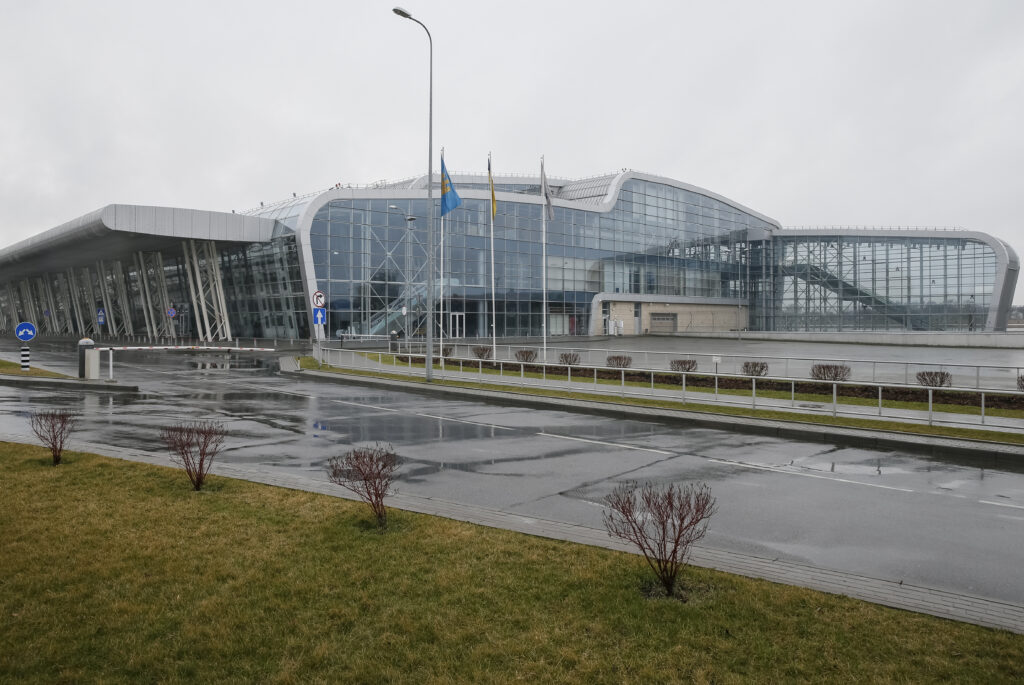
Wartime Ukraine needs an airport: Lviv is the obvious option

After almost two and a half years of war, Ukraine still doesn’t have a working airport. Instead, the journey in and out of the country must be undertaken by road or rail. This takes days and costs the country billions annually in lost revenues. The absence of a functioning airport complicates travel for everyone, from aid workers and volunteers to visiting international dignitaries and Ukrainian President Volodymyr Zelenskyy himself.
Why hasn’t wartime Ukraine managed to reopen any of its airports yet? Security is of course the primary concern, but this is not an insurmountable obstacle. For proof, Ukraine need look no further than Israel. Major American airlines stopped flights in and out of Israel’s David Ben Gurion Airport in October 2023, but after assessing the risks and ensuring that air defense systems were able to protect the airport, commercial air travel resumed.
The Ukrainian authorities should learn from the Israeli experience. With the right air defense systems and security precautions in place, Ukraine could and should reopen its first airport by Christmas 2024.
Stay updated
As the world watches the Russian invasion of Ukraine unfold, UkraineAlert delivers the best Atlantic Council expert insight and analysis on Ukraine twice a week directly to your inbox.
The Ukrainian government is currently engaged in efforts to reopen one of the country’s airports, and is reportedly making progress toward receiving the green light from the European Union Aviation Safety Agency (EASA). If confirmed, this would enable private insurance companies to cover flights and passengers.
According to President Zelenskyy, Ukraine is set to receive around seven new air defense systems in the coming months. This makes the idea of reopening an airport in the war-torn country plausible. The big question is which airport Ukraine should aim to open. Four cities are believed to be on the shortlist: Kyiv, Lviv, Odesa, and Uzhhorod.
At first glance, Kyiv might seem like the natural choice. With the strongest air defense systems in the country concentrated around the Ukrainian capital, there is certainly a case to be made for reopening Boryspil International Airport.
However, Russia managed to overwhelm Kyiv’s air defenses on multiple occasions during the first seven months of 2024 with waves of airstrikes using a variety of missile types. In July, Moscow hit Ukraine’s leading children’s hospital in a targeted attack. It is not difficult to imagine Putin’s response if commercial flights resumed at Boryspil, which is relatively close to Russia and far from the security of EU airspace. It is therefore difficult to see how Kyiv could be adequately protected to satisfy the international transport authorities.
The next potential option is Odesa. Located on Ukraine’s Black Sea coast, Odesa boasts a recently renovated international airport but is vulnerable to Russian missile strikes from both sea and air. Russian missiles launched from the Black Sea can strike the city in a matter of minutes. From an airport security perspective, airplanes and passengers are sitting ducks. There is no way international airlines would agree to fly in such conditions.
Uzhhorod, a sleepy city in southwestern Ukraine close to the Slovakian border, is also a contender. Uzhhorod is the furthest Ukrainian airport from Russia, providing air defense crews with additional time to prepare for potential airstrikes. The airport’s location just meters away from the border with NATO member Slovakia would also likely help to deter Russian attacks.
Despite these advantages, Uzhhorod and the surrounding environment are not well suited to the role of international gateway. The nearby Carpathian Mountains serve as a natural barrier to the rest of Ukraine, complicating travel and making it difficult to move anywhere quickly. Uzhhorod airport also has a modest runway and very limited capacity, meaning it would only be able to accept short haul flights and smaller planes.
Eurasia Center events
If the Ukrainian authorities are serious about reopening an airport in wartime conditions, the obvious choice is Lviv in western Ukraine. Security experts and insurance companies measure air travel risk in terms of flights, passengers, and infrastructure. Flights to and from Lviv are seen as relatively low risk because the average journey time from the city to Polish airspace is just seven minutes. The security risks facing passengers are considerably higher, and would require bomb shelter facilities capable of accommodating hundreds of passengers in the event of incoming Russian airstrikes.
The key remaining risk which has yet to be addressed is protection for Lviv International Airport itself. Experts believe this would require one air defense system, which could protect the entire airport and the surrounding region.
Lviv International Airport is one of Ukraine’s most modern airports. It was completely reconstructed prior to the Euro 2012 European football championship, which Ukraine co-hosted together with Poland, and can receive most categories of commercial and cargo flights. Meanwhile, Lviv itself has long been the main transport hub for western Ukraine and boasts good connections to the rest of the country.
There are already signs that the reopening of Lviv International Airport would prove popular with airlines. So far, at least nine international commercial carriers have reportedly expressed an interest in launching new Lviv services if the airport does resume operations.
Looking ahead, President Zelenskyy and his military commanders will be forced to make some hard trade-offs as they decide how best to deploy Ukraine’s limited supplies of air defense systems. They must balance a range of needs including protecting the civilian population, guarding the country’s infrastructure, and shielding soldiers along the front lines of the war. Nobody would envy Ukraine’s leaders as they wrestle with these choices.
While reopening a Ukrainian airport will involve painful opportunity costs elsewhere, the resumption of air travel would represent an unparalleled declaration that Ukraine is committed to outlasting the Russian threat. It would dramatically improve Ukraine’s connectivity with the outside world and demonstrate that the country is very much open for business. For the approximately six million Ukrainian refugees currently living in the EU, a functioning airport would represent a vital link to family and friends back home.
If President Zelenskyy wants to send a signal to the international community that Ukraine is committed to victory, he should make the reopening of an international airport a strategic priority. This would strengthen the Ukrainian economy and boost national morale, while also making it far easier for friends and supporters of Ukraine to visit the country. I’ll be on the first flight.
Melinda Haring is a senior advisor at Razom for Ukraine and a non-resident senior fellow at the Atlantic Council.
Further reading
The views expressed in UkraineAlert are solely those of the authors and do not necessarily reflect the views of the Atlantic Council, its staff, or its supporters.

The Eurasia Center’s mission is to enhance transatlantic cooperation in promoting stability, democratic values and prosperity in Eurasia, from Eastern Europe and Turkey in the West to the Caucasus, Russia and Central Asia in the East.
Follow us on social media
and support our work
Image: Lviv International Airport. March 10, 2016. REUTERS/Gleb Garanich






